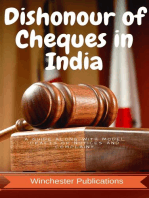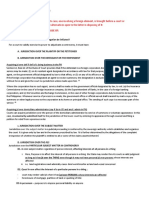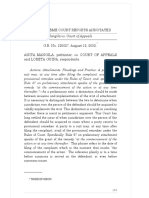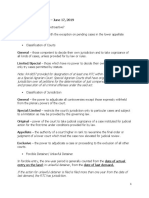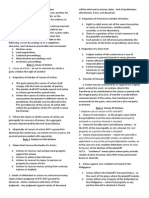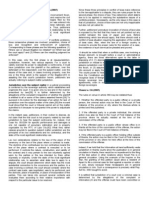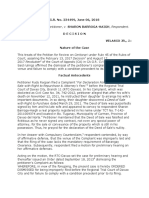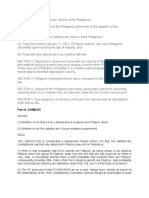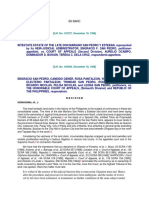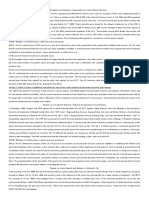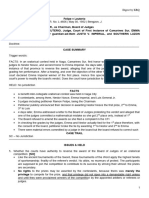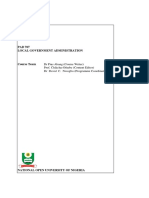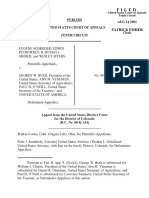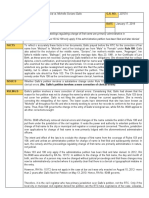Rule 4 - Venue of Actions Discussion Outline
Rule 4 - Venue of Actions Discussion Outline
Uploaded by
KodeconCopyright:
Available Formats
Rule 4 - Venue of Actions Discussion Outline
Rule 4 - Venue of Actions Discussion Outline
Uploaded by
KodeconOriginal Title
Copyright
Available Formats
Share this document
Did you find this document useful?
Is this content inappropriate?
Copyright:
Available Formats
Rule 4 - Venue of Actions Discussion Outline
Rule 4 - Venue of Actions Discussion Outline
Uploaded by
KodeconCopyright:
Available Formats
RULE 4 – VENUE OF ACTIONS DISCUSSION OUTLINE
Venue defined and distinguished-
Venue is the place where the action is to be commenced and tried. It has also
been defined as the proper location for the trial of a case.
Distinguishing it from jurisdiction: (a) venue is the place where action is
commenced and tried, jurisdiction is the authority of a court to hear and
decide the action (b) venue may be waived, jurisdiction over the subject matter
cannot be waived, but that over the person can be waived (c) venue may be the
subject of a written agreement, jurisdiction cannot be subject of a written
agreement (d) a court cannot motu-propio dismiss on improper venue, while if
it has no jurisdiction, a court can motu-propio dismiss the action.
Rules on venue-
Section 1 provides that if it is a real action or one that affects title to or
possession of real property, or an interest therein, it shall be commenced and
tried in the proper court, which has jurisdiction over the area wherein the real
property involved, or a portion thereof is situated. Forcible Entry and Detainer
actions are to be commenced and tried in the Municipal Trial Court, which has
jurisdiction over the area wherein the real property involved, or any portion
thereof, is situated.
Section 2 provides that if it is a personal action or one that is brought for the
recovery of personal property, for the enforcement of a contract or recovery of
damages for its breach of for the recovery of damages due to injury to person or
property or such all other actions shall be commenced or tried where the
plaintiff or any of the principal plaintiffs reside or any of the defendants reside,
or if a non-resident defendant, where he may be found at the election of the
plaintiff.
Reside means the place of abode, whether permanent or temporary, as
distinguished from domicile or the fixed permanent residence, where if one is
absent he intends to return.
Section 3 provides that if the defendant is a non-resident or one who does not
reside and is not found in the Philippines and the action affects the personal
status of the plaintiff, or any property of said defendant located in the
Philippines, the action may be commenced and tried in the court of the place
where the plaintiff resides, or where the property or any portion thereof is
situated or found.
When the rules on venue are not applicable-
Section 4 provides that they do not apply:
1. In cases where a specific rule or law provides otherwise.
2. Where the parties have validly agreed in writing before the filing of the
action as to exclusive venue.
Any agreement as to venue must be in writing and for exclusivity, the intent must
be clear, otherwise, it will be interpreted to allow for an additional venue.
In the case of Sweet Lines v Teves (83 SCRA 361), the court said the freedom of the
parties to stipulate on the venue is however subject to the usual rules on contract
interpretation. Where the provision appears to be one-sided as to amount to a
contract of adhesion, the consent of the parties thereto may well be vitiated and
the venue stipulation will not be given effect.
The rule on venue is party oriented. It looks to the convenience of the parties.
Thus the rule on venue as to real actions presumes that the place where the
subject real property is located is convenient to the parties. Hence, the rule as to
venue can yield to an agreement as to exclusive venue. Section 4, Rule 4 applies
to both real and personal actions as long as the requisites are met.
In the case of Briones v. CA and Cash Asia Credit Corporation (G.R. No. 204444,
January 14, 2015), the court said that in cases where the complaint assails only
the terms, conditions, and/or coverage of a written instrument and not its
validity, the exclusive venue stipulation contained therein shall still be binding
on the parties, and thus, the complaint may be properly dismissed on the ground
of improper venue. Conversely, therefore, a complaint directly assailing the
validity of the written instrument itself should not be bound by the exclusive
venue stipulation contained therein and should be filed in accordance with the
general rules on venue. To be sure, it would be inherently consistent for a
complaint of this nature to recognize the exclusive venue stipulation when it, in
fact, precisely assails the validity of the instrument in which such stipulation is
contained.
In the case of Philippine Bank of Communications v Lim (455 SCRA 714), venue as
stipulated in the promissory note shall govern notwithstanding the absence of a
stipulation as to venue in an accompanying surety agreement as the latter can
only be enforced in conjunction with the former.
How venue is questioned-
Venue may be questioned in an answer by way of an affirmative defense. If it is
not questioned, it is deemed waived.
You might also like
- Simple Guide for Drafting of Civil Suits in IndiaFrom EverandSimple Guide for Drafting of Civil Suits in IndiaRating: 4.5 out of 5 stars4.5/5 (4)
- Civil Procedure 1Document47 pagesCivil Procedure 1Eron Roi Centina-gacutanNo ratings yet
- Dishonour of Cheques in India: A Guide along with Model Drafts of Notices and ComplaintFrom EverandDishonour of Cheques in India: A Guide along with Model Drafts of Notices and ComplaintRating: 4 out of 5 stars4/5 (1)
- Rule 4Document38 pagesRule 4Fritzie G. PuctiyaoNo ratings yet
- Radiowealth Finance Company Vs Alfonso PinedaDocument3 pagesRadiowealth Finance Company Vs Alfonso PinedaChristine Rose Bonilla LikiganNo ratings yet
- Planters Development Bank V Spouses RamosDocument3 pagesPlanters Development Bank V Spouses RamosPhi SalvadorNo ratings yet
- Answer Sheet-AaplicationDocument3 pagesAnswer Sheet-AaplicationKARL JHON RICAFRANCANo ratings yet
- Civpro 3B VILLAROMAN, Janine Monica D. 14 October 2020Document2 pagesCivpro 3B VILLAROMAN, Janine Monica D. 14 October 2020Ja VillaromanNo ratings yet
- RULE 4 VENUE EusebioDocument5 pagesRULE 4 VENUE EusebioeusebiomadNo ratings yet
- CIVPRO Rule4-10Document7 pagesCIVPRO Rule4-10Duke SucgangNo ratings yet
- LMT - Rem 1-FinalsDocument11 pagesLMT - Rem 1-FinalsClark CenizaNo ratings yet
- Briones v. CA, VenueDocument5 pagesBriones v. CA, Venuedyosa100% (1)
- Civ Pro Rule 1-10Document6 pagesCiv Pro Rule 1-10Joy GamboaNo ratings yet
- Radiowealth Finance Company, Inc. vs. Pineda, JR PDFDocument7 pagesRadiowealth Finance Company, Inc. vs. Pineda, JR PDFEmir MendozaNo ratings yet
- Rule 3 4 NOTESDocument2 pagesRule 3 4 NOTESTrisha KerstinNo ratings yet
- Making Sense of The CasesDocument14 pagesMaking Sense of The CasesNicole San JuanNo ratings yet
- Rule 57 - Notes (Case Doctrines)Document18 pagesRule 57 - Notes (Case Doctrines)PJ SLSRNo ratings yet
- Rule 1 General Provisions: Criminal Action - One by Which TheDocument14 pagesRule 1 General Provisions: Criminal Action - One by Which TheJanine Blaize Oplay CaniwNo ratings yet
- Radiowealth Finance Company, Inc., vs. Pineda G.R. No. 227147, July 30, 2018 FactsDocument2 pagesRadiowealth Finance Company, Inc., vs. Pineda G.R. No. 227147, July 30, 2018 FactsChristine Rose Bonilla LikiganNo ratings yet
- Civil Procedure ReviewerDocument28 pagesCivil Procedure Reviewerperez_bariuanNo ratings yet
- Rule 1-10 Civil ProcedureDocument23 pagesRule 1-10 Civil ProcedureZach Matthew GalendezNo ratings yet
- Civil ProcedureDocument61 pagesCivil ProcedureJohn Vincent CamralNo ratings yet
- Rule 4 Venue BRIONES VDocument2 pagesRule 4 Venue BRIONES VHanz KyNo ratings yet
- Notes Civpro MidtermDocument8 pagesNotes Civpro MidtermLyrics DistrictNo ratings yet
- Unimaster Conglomeration Inc. vs. Court of AppealsDocument3 pagesUnimaster Conglomeration Inc. vs. Court of AppealsDaisyKeith VinesNo ratings yet
- Civil Procedure Outline Rule 1-20Document11 pagesCivil Procedure Outline Rule 1-20Rogie ToriagaNo ratings yet
- Rule 1 General ProvisionsDocument28 pagesRule 1 General ProvisionsEm AlayzaNo ratings yet
- Rule 04 - VenueDocument18 pagesRule 04 - VenueRalph Christian Lusanta Fuentes100% (2)
- Civil Procedure 2Document34 pagesCivil Procedure 2ndodooamooNo ratings yet
- Pice Life MembersDocument275 pagesPice Life MembersAlvin ClaridadesNo ratings yet
- Mangila vs. CADocument20 pagesMangila vs. CAPatricia SanchezNo ratings yet
- Notes and Discussion - Remedial LawDocument3 pagesNotes and Discussion - Remedial LawKeziah HuelarNo ratings yet
- Boston Equity Resources Inc., Vs Court of Appeals and Lolita G. Toledo G.R. NO. 173946Document52 pagesBoston Equity Resources Inc., Vs Court of Appeals and Lolita G. Toledo G.R. NO. 173946'Joshua Crisostomo'No ratings yet
- Holy Spirit Homeowners Association V Defensor (Digest)Document2 pagesHoly Spirit Homeowners Association V Defensor (Digest)springchicken8867% (3)
- Civil Procedure Code Exam Notes Final (13221)Document115 pagesCivil Procedure Code Exam Notes Final (13221)Rajkumar SinghalNo ratings yet
- Civ Pro ReviewerDocument141 pagesCiv Pro ReviewerDr MailmanNo ratings yet
- Orca Share Media1515825631865Document142 pagesOrca Share Media1515825631865Alma PadrigoNo ratings yet
- Rule 4-10Document28 pagesRule 4-10Montavani HabawelNo ratings yet
- Civil Procedure DoctrinesDocument51 pagesCivil Procedure DoctrinesEricha Joy GonadanNo ratings yet
- Kazuhiro Hasegawa and Nippon Engineering Consultants Co., LTD v. KitamuraDocument3 pagesKazuhiro Hasegawa and Nippon Engineering Consultants Co., LTD v. KitamuraPaolo BañaderaNo ratings yet
- Civil Procedure Doctrines: 1. Boston Equity Resources Inc., Vs Court of Appeals and Lolita G. Toledo G.R. NO. 173946Document51 pagesCivil Procedure Doctrines: 1. Boston Equity Resources Inc., Vs Court of Appeals and Lolita G. Toledo G.R. NO. 173946Rey LacadenNo ratings yet
- Civil Procedure Code - AnswersDocument5 pagesCivil Procedure Code - Answerskhushi guptaNo ratings yet
- Caseload 5 DigestsDocument11 pagesCaseload 5 DigestsjoyiveeongNo ratings yet
- Civil ProcedureDocument113 pagesCivil ProcedureNowhere Man100% (1)
- Notes Rule 4 9Document110 pagesNotes Rule 4 9Winston Mao TorinoNo ratings yet
- 2008 Lecture Notes On Civil ProcedureDocument223 pages2008 Lecture Notes On Civil ProcedureJohanna ArnaezNo ratings yet
- Civil Procedure Rule 1 General ProvisionsDocument20 pagesCivil Procedure Rule 1 General ProvisionsKenneth HolascaNo ratings yet
- Molina, Allan A. 23-838rlDocument3 pagesMolina, Allan A. 23-838rlAllan MolinaNo ratings yet
- Civil Procedure ReviewerDocument5 pagesCivil Procedure ReviewerDamanMandaNo ratings yet
- Chapter Xiv - Judicial Jurisdiction, Forum Non Conveniens, Venue and SummonsDocument39 pagesChapter Xiv - Judicial Jurisdiction, Forum Non Conveniens, Venue and Summonsmalou_corderoNo ratings yet
- R 4 V O A: Uniform Rule On Venue in RTC and MTCDocument1 pageR 4 V O A: Uniform Rule On Venue in RTC and MTCMaria ThereseNo ratings yet
- 2008 Civil ProcedureDocument142 pages2008 Civil ProcedureDi CanNo ratings yet
- GR 234499 Racpan V BarrogaDocument3 pagesGR 234499 Racpan V Barrogadonna panlilioNo ratings yet
- Jurisdiction DoctrinesDocument10 pagesJurisdiction DoctrinesJoyce Grace CasasNo ratings yet
- Civ. Pro. C., Art. 402 (1) Prof. Allen Sedler, Ethiopian Civil Procedure (1968), p.285 Black's Law Dictionary (4 Ed. 1968)Document11 pagesCiv. Pro. C., Art. 402 (1) Prof. Allen Sedler, Ethiopian Civil Procedure (1968), p.285 Black's Law Dictionary (4 Ed. 1968)Sophia Andrea DomingoNo ratings yet
- Rule I General ProvisionsDocument147 pagesRule I General ProvisionsJaspherose Peralta MalicdanNo ratings yet
- Civil ProcedureDocument115 pagesCivil ProceduredwightddaoNo ratings yet
- CIVPROC Finals Reviewer - 25 CasesDocument10 pagesCIVPROC Finals Reviewer - 25 CasesPaul SarangayaNo ratings yet
- Racpan Vs HaighDocument7 pagesRacpan Vs HaighPapoi LuceroNo ratings yet
- California Supreme Court Petition: S173448 – Denied Without OpinionFrom EverandCalifornia Supreme Court Petition: S173448 – Denied Without OpinionRating: 4 out of 5 stars4/5 (1)
- Rule 9 - Effects of Failure To Plead Discussion OutlineDocument3 pagesRule 9 - Effects of Failure To Plead Discussion OutlineKodeconNo ratings yet
- Rule 12 - Bill of Particulars Discussion OutlineDocument2 pagesRule 12 - Bill of Particulars Discussion OutlineKodeconNo ratings yet
- Module 4 CasesDocument15 pagesModule 4 CasesKodeconNo ratings yet
- Module 9 CasesDocument8 pagesModule 9 CasesKodeconNo ratings yet
- Ebralinag Vs Division SuperintendentDocument9 pagesEbralinag Vs Division SuperintendentKodeconNo ratings yet
- R V DayaoenDocument12 pagesR V DayaoenKodeconNo ratings yet
- Republic of The Philippines Supreme Court ManilaDocument8 pagesRepublic of The Philippines Supreme Court ManilaKodeconNo ratings yet
- Intestate Vs CADocument17 pagesIntestate Vs CAKodeconNo ratings yet
- Uy vs. BIR Search and Seizure - Requisites of A Valid Search WarrantDocument6 pagesUy vs. BIR Search and Seizure - Requisites of A Valid Search WarrantKodeconNo ratings yet
- Maritime Liens Revisited: From Historical Development To Contemporary National Law A Journey Towards International UnificationDocument26 pagesMaritime Liens Revisited: From Historical Development To Contemporary National Law A Journey Towards International UnificationTafsir JohanssonNo ratings yet
- Criminal LawDocument23 pagesCriminal LawAvinash MishraNo ratings yet
- 5 San Miguel V NLRCDocument3 pages5 San Miguel V NLRCChristiane Marie BajadaNo ratings yet
- Hooghe Marks 2002 - Types MultI Level GovernanceDocument32 pagesHooghe Marks 2002 - Types MultI Level GovernanceEdward T MaiaNo ratings yet
- Falcis III v. Civil Registrar General, G.R. No. 217910, Sept. 3, 2019Document103 pagesFalcis III v. Civil Registrar General, G.R. No. 217910, Sept. 3, 2019Britt John BallentesNo ratings yet
- Chapter 11 Solutions - Review Questions and ExercisesDocument8 pagesChapter 11 Solutions - Review Questions and Exercisesbip6420No ratings yet
- The Kenya Chapter International Arbitration ReviewDocument26 pagesThe Kenya Chapter International Arbitration ReviewIbrahim Abdi AdanNo ratings yet
- American Career Institute Consent JudgmentDocument26 pagesAmerican Career Institute Consent JudgmentPatrick JohnsonNo ratings yet
- Barcenas vs. Tomas 454 SCRA 593 March 31 2005 PDFDocument18 pagesBarcenas vs. Tomas 454 SCRA 593 March 31 2005 PDFFrancis OcadoNo ratings yet
- Corey Howard LawsuitDocument9 pagesCorey Howard LawsuitPhiladelphiaMagazineNo ratings yet
- 9 Felipe V LeuterioDocument2 pages9 Felipe V LeuterioKate QuincoNo ratings yet
- Local Government Administration-2Document136 pagesLocal Government Administration-2Mohamed Said MohamedNo ratings yet
- Alba Vs CA - 164041 - July 29, 2005 - JDocument8 pagesAlba Vs CA - 164041 - July 29, 2005 - JMarchini Sandro Cañizares KongNo ratings yet
- PCGG v. DumayasDocument2 pagesPCGG v. DumayasRidzanna AbdulgafurNo ratings yet
- Civ Pro Outline Campos Fall 2010Document52 pagesCiv Pro Outline Campos Fall 2010James Murray SlaterNo ratings yet
- Service of Documents AbroadDocument24 pagesService of Documents AbroadAnubhutiVarmaNo ratings yet
- AttyDeVera Syllabus 2019Document6 pagesAttyDeVera Syllabus 2019Raffy MarianoNo ratings yet
- Rule 110 and QuizDocument14 pagesRule 110 and QuizAyz KatigbakNo ratings yet
- Fort Monroe National Historical Park Establishment Act of 2011Document16 pagesFort Monroe National Historical Park Establishment Act of 2011MarkWarnerNo ratings yet
- The Roleof Judiciaryin IndiaDocument6 pagesThe Roleof Judiciaryin IndiaSheela AravindNo ratings yet
- Filed: Patrick FisherDocument17 pagesFiled: Patrick FisherScribd Government DocsNo ratings yet
- 6 - Yuk Ling Ong vs. CoDocument12 pages6 - Yuk Ling Ong vs. CoAnnaNo ratings yet
- Compilation of Cases Except No.19Document134 pagesCompilation of Cases Except No.19I.G. Mingo MulaNo ratings yet
- Principles of Law PART 1Document81 pagesPrinciples of Law PART 1Makaha Rutendo33% (3)
- HLC Construction Vs Emily HomesDocument6 pagesHLC Construction Vs Emily HomesGladys BantilanNo ratings yet
- 2.01 Tijam V Sibonghanoy DigestDocument1 page2.01 Tijam V Sibonghanoy DigestKate GaroNo ratings yet
- Access To Neighbouring LandDocument4 pagesAccess To Neighbouring LandAnthonyNo ratings yet
- Prosecution ArgumentDocument24 pagesProsecution Argumentashoko.guptaNo ratings yet
- Republic of The Philippines vs. Michelle SorianoDocument2 pagesRepublic of The Philippines vs. Michelle SorianoEdith OliverosNo ratings yet
- Professional Ethics:-Principles of Professional EthicsDocument22 pagesProfessional Ethics:-Principles of Professional Ethicsarghasen2014No ratings yet


